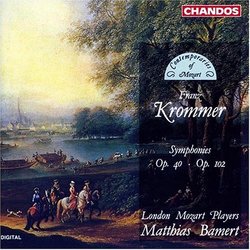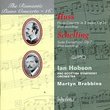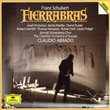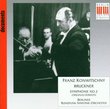| All Artists: Franz Krommer, Matthias Bamert, London Mozart Players Title: Krommer: Symphonies 40 & 102 Members Wishing: 0 Total Copies: 0 Label: Chandos Release Date: 5/31/1994 Genre: Classical Styles: Historical Periods, Classical (c.1770-1830), Symphonies Number of Discs: 1 SwapaCD Credits: 1 UPC: 095115927526 |
Search - Franz Krommer, Matthias Bamert, London Mozart Players :: Krommer: Symphonies 40 & 102
 | Franz Krommer, Matthias Bamert, London Mozart Players Krommer: Symphonies 40 & 102 Genre: Classical
|
Larger Image |
CD DetailsSimilar CDs
|
CD ReviewsHo hum Larry VanDeSande | Mason, Michigan United States | 01/17/2005 (3 out of 5 stars) "Since being converted to Krommer by that old LP of Octets from the Netherlands Wind Ensemble, I have habitually bought Krommer LPs, tapes and CDs. This one was interesting because it included Krommer's rarely recorded symphonies. A group from Prague recorded the Op. 40 symphony about 20 years ago on a Czech label LP and cassette that was part of a two-record and two-cassette set of music by Krommer and his countrymen. Compared to that recording, which is no longer available, this one doesn't sound very much like Krommer. True to his normal style, Matthias Bamert pushes the gentle humorous music of Franz Krommer beyond its ability to respond. While the result is a mimic of a woodwind-driven early Beethoven composition, it sounds little like the Moravian craftsman that composed concertos, octets and other forms for woodwinds. Specifically, this CD lacks breath (not breadth) and humor, two ingredients that make Krommer an enjoyable experience. Unfortunately, there is no where to turn right now to hear these symphonies other than this hard-pressed recording. When something else becomes available you will understand how Bamert takes this music far from its element in these recordings." A Beethoven Contemporary with a Distinctive Voice Larry VanDeSande | 10/10/2001 (5 out of 5 stars) "The Moravian composer Franz Krommer (Frantisek Kramar) wrote some appealing concertos and chamber music for wind instruments that will be familiar to devotees of winds. But his symphonies aren't well known at all, and that's a pity because they stand as correctives to the notion that only Beethoven and Schubert were writing effective symphonies in the first two decades of the 19th century. They share certain attributes of the works of Krommer's famous contemporaries--the heft and thrust of Beethoven's symphonies, as well as the bubbling melodic qualities of Schubert's--though they lack the motivic economy and drive of Beethoven and the harmonic inventiveness of Schubert.The works recorded here are from 1803 and (probably) from around 1820. The earlier work seems tighter in construction while the later work has a pre-Romantic expansiveness that mirrors the direction Beethoven was taking in his later symphonies. Both are memorably tuneful and exhibit expert development of their melodic material. I prefer the earlier work, but that's only because the Symphony Op. 102 seems slightly schizophrenic. In C minor/major, it starts with a darkly weighty Largo (colored by the trio of trombones Krommer includes) that gives way to a very dramatic Allegro vivace lightened by the bubbly second theme, something out of one of Schubert's early symphonies. The dignified slow movement has an air of classical poise that reminds me somewhat of Cherubini. Then there is a wittily sardonic scherzo that sounds like a fast-forward version of Gounod's "Funeral March of a Marionette"!The last movement dispels any shadows, bustling along like the light-hearted finale of one of Krommer's concertos--pleasant and appealingly melodic, but is this the same symphony that started out so portentously? Well, maybe it doesn't all hang together emotionally, but this is a well-crafted work with many memorable bits, and in a performance such as Matthias Bamert's, it is a symphony that demands ahearing. The London Mozart Players, a very distinguished group, respond to Bamert's alert conducting with playing that is poised and wonderfully weighty when need be. Excellent, impactive sound rounds out this installment in Bamert's well-received series of symphonies by Mozart contemporaries. (By the way, Krommer was only three years younger than Mozart!)"
|

 Track Listings (8) - Disc #1
Track Listings (8) - Disc #1




